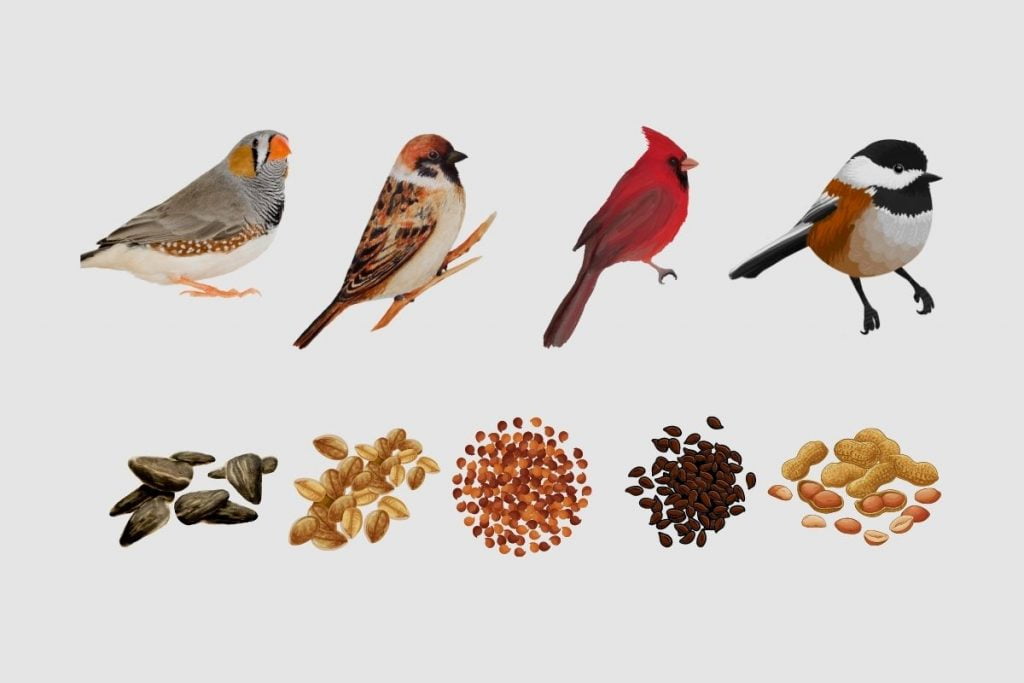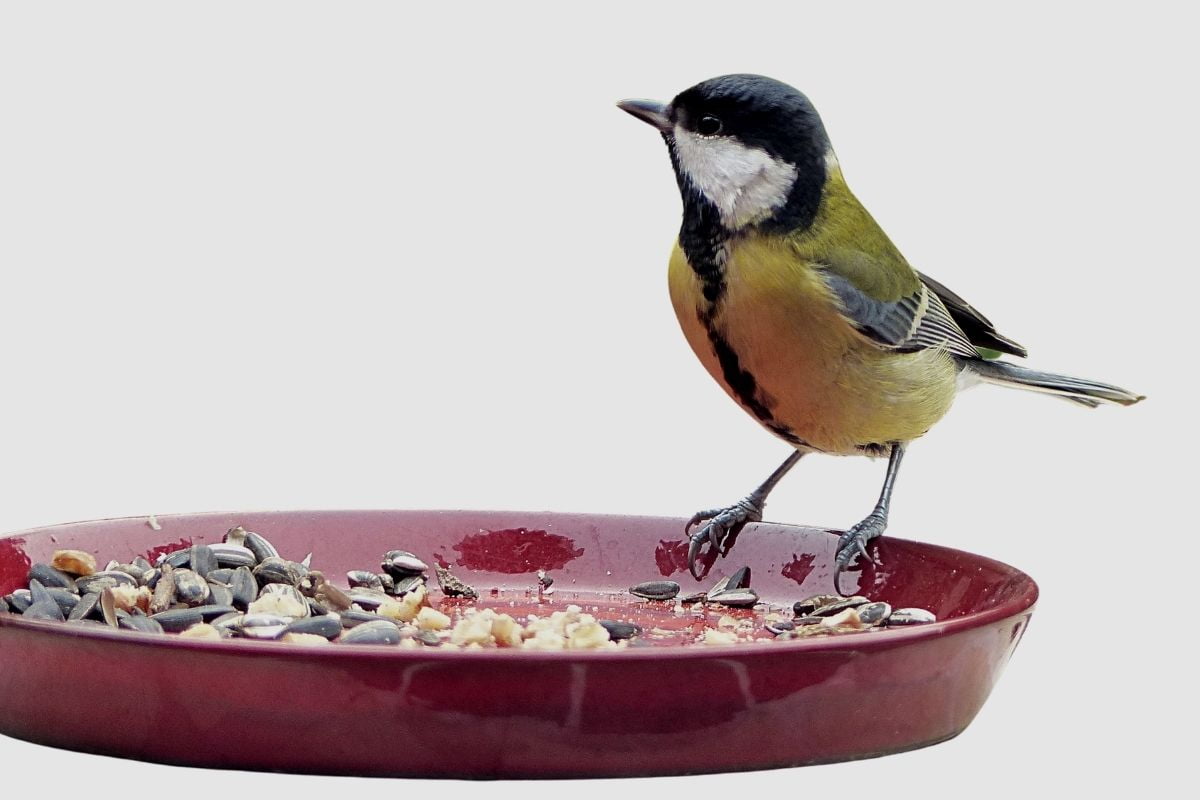Bird seed plays a significant role in supporting bird populations, especially during times when natural food sources are scarce. Feeding birds can be an enjoyable and rewarding pastime, but it’s essential to practice responsible bird feeding to ensure the well-being of our feathered friends.
In this article, we’ll explore the various aspects of bird seed and bird feeding, covering everything from bird species’ dietary preferences to the most effective pest control methods.

Bird Species and Their Dietary Preferences
Understanding the dietary preferences of different bird species is key to selecting the appropriate bird seed. Here’s a brief overview of some common species and their preferred seeds:
Finches: Sunflower seeds, nyjer seeds
Sparrows: Millet, sunflower seeds
Cardinals: Sunflower seeds, safflower seeds
Chickadees: Sunflower seeds, peanuts.
To attract and support local species, it’s essential to research and adapt your bird seed selection to the birds found in your region.

Types of Bird Seeds
A variety of seeds are commonly used in bird seed mixes to cater to diverse bird species:
- Sunflower seeds: Rich in protein and fat, suitable for many birds.
- Millet: Small and easily digestible, preferred by ground-feeding birds.
- Safflower: High in protein and fat, favoured by cardinals and grosbeaks.
- Nyjer (thistle): Nutrient-dense, especially attractive to finches
- Peanuts: High in protein and fat, loved by chickadees and woodpeckers.
Customizing seed mixes to attract specific birds can be a rewarding way to enhance your bird-feeding experience.
Bird Feeders
Bird feeders come in various designs and styles, each suited to different bird species and seed types:
- Tube feeders: Ideal for small seeds like nyjer and sunflower, favoured by finches and chickadees.
- Platform feeders: Suitable for ground-feeding birds, such as sparrows and doves.
- Hopper feeders: Hold larger quantities of seed and attract a wide range of birds, including cardinals.
- Suet feeders: Designed to hold suet cakes, attracting woodpeckers and other insect-eating birds.
Consider factors like seed type, bird species, and feeder placement when selecting the perfect bird feeder.

Responsible Bird Feeding Practices
To feed birds responsibly, it’s essential to follow proper feeding techniques:
- Offer a variety of seeds to cater to diverse dietary needs.
- Clean feeders regularly to prevent mould and disease.
- Avoid overcrowding by providing multiple feeding stations.
- Adjust feeding frequency based on the season and natural food availability.
By practising responsible bird feeding, we can minimize the risk of disease transmission and help support wild bird populations.
Birdwatching and Bird Feeding
Bird feeding can be an excellent way for bird lovers to attract specific species for birdwatching. When using birdseed to observe birds, consider the ethical implications and ensure that your actions don’t disrupt their natural behaviours or put them at risk.
Birdwatching can also contribute to wildlife conservation by raising awareness and fostering a deeper connection with nature.
Wildlife Conservation and Bird Feeding
Bird feeding can have both positive and negative impacts on local ecosystems. By providing supplemental food, we can support bird populations during harsh conditions. However, excessive feeding can lead to an overreliance on human-provided food sources.
Integrating bird feeding with habitat restoration efforts, such as planting native plants and providing nest boxes, can help create a more balanced approach to supporting bird populations.

Ornithology and Bird Seed Research
In recent years, ornithology research has revealed a great deal of information about bird diets and foraging behaviour.
Studies have been conducted to understand better the effects of bird seed on wild bird populations as well as the long-term sustainability of various feeding strategies. Such research is invaluable in developing effective bird-feeding practices that support wild birds.
Aviculture and Bird Nutrition
Captive birds often rely on seed-based diets to fulfil their nutritional needs. Understanding the nutrient content of various bird seeds can help provide captive birds with appropriate nutrition.
Additionally, it’s important to supplement seed-based diets with other food sources, such as fresh fruits and vegetables, to ensure complete nutrition.
Pest Control and Bird Feeding
Birds aren’t the only ones who enjoy a tasty snack from the feeder; squirrels and rodents can also be quite persistent in their pursuit of a meal. To protect your bird feeder from pests, consider using squirrel-proof feeders or other deterrents such as cayenne pepper or motion-activated sprinklers. Implementing non-lethal pest control methods is essential for protecting both birds and other wildlife.
Conclusion
In conclusion, practising responsible bird feeding is essential for sustaining healthy bird populations and preserving biodiversity in our local ecosystems.
By selecting an appropriate variety of bird seeds, understanding species’ dietary preferences, and taking proper precautions against disease transmission and pest infestations, we can ensure that our feathered friends are getting the nutrition they need while fostering a deeper connection with nature.
I hope you found this article helpful. If yes, please don’t forget to share it with your friends, and remember to leave a comment below about your experience with bird seeds.
Frequently Asked Questions (FAQ)
Q: How can I feed wild birds sustainably?
A: To feed wild birds sustainably, choose native plants that naturally provide food for birds, limit supplemental feeding, and avoid foods harmful to birds. Ensure the food you provide is high-quality and suitable, such as black oil sunflower seeds or cracked corn.
Q: What are the best times to feed birds year-round?
A: Although you can feed birds year-round, the best times are during periods when natural food is scarce, such as late winter and early spring. Avoid overfeeding in summer when natural food is abundant.
Q: How should I clean my backyard feeders to keep birds healthy?
A: Clean your backyard feeders every two weeks or more frequently if you notice sick birds. Use a solution of one part bleach to nine parts water, and rinse thoroughly before refilling.
Q: Are there certain feeders better suited for specific wild bird species?
A: Yes, different bird species prefer different types of feeders. For instance, a hummingbird feeder with nectar is ideal for hummingbirds, while tube feeders with black oil sunflower seeds might attract goldfinches and nuthatches. Choose feeders that cater to specific needs of your feathered friends.
Q: What should I do if I notice sick birds at my feeders?
A: If you notice sick birds, stop feeding immediately, clean all feeders thoroughly with a bleach solution, and consult your local Audubon society or humane society for advice. Preventing the spread of disease is crucial for maintaining a healthy wild bird population.
Q: Can feeding wild birds attract unwanted pests or wildlife?
A: Yes, feeding wild birds can attract pests like rats or other wildlife. To minimize this, keep seed in secure containers, clean up fallen seed regularly, and avoid ground feeding. Rake under feeders frequently to remove leftover food that may attract pests.
Q: What should I do to prevent bird strikes at my feeders?
A: Place your feeders either very close to windows (less than 3 feet) or more than 30 feet away to reduce the risk of bird strikes. Use decals or anti-collision stickers on windows to make them visible to birds.
Q: Why should I feed wild birds during winter?
A: Feeding wild birds during winter is essential because natural food sources become scarce. Providing high-energy foods like black oil sunflower seeds and suet helps birds maintain energy levels and survive harsh conditions. Birds need extra energy to stay warm during cold weather.
Q: How can I make my backyard more bird-friendly without feeding?
A: Plant native plants that provide natural food, offer fresh water, and create shelter with trees and shrubs. These practices help attract birds without relying on feeders, creating a balanced habitat that benefits birds year-round.
Q: What are some native plants that feed wild birds in my backyard?
A: Planting native species is one of the best ways to attract and feed wild birds. Native plants such as coneflowers, sunflowers, and serviceberries provide natural food sources like seeds and berries. These plants support local ecosystems and offer a sustainable food supply for various bird species year-round.
Q: How can I support small birds at my feeders?
A: To support small birds like chickadees and finches, use feeders designed for their size, such as tube feeders with small perches. Provide seeds they prefer, like nyjer and sunflower hearts. Additionally, ensure feeders are placed in safe locations away from predators and provide nearby shrubs or trees for cover.
Q: Why is it important to feed birds during spring and summer?
A: Feeding birds during spring and summer helps support them during nesting and raising their young. High-protein foods like mealworms and suet are especially beneficial. While natural food is more abundant in these seasons, supplemental feeding can provide additional nutrients and energy.
Q: What should I consider if I’m going to feed wild birds in my backyard?
A: When feeding wild birds, ensure you use high-quality bird seed, provide a variety of food types, and keep feeders clean to prevent disease. It’s also important to place feeders in safe areas and to monitor for any signs of illness among birds at your feeders.
Q: How can native plants enhance the habitat for birds at your feeders?
A: Native plants offer natural food sources like seeds, fruits, and nectar and also provide shelter and nesting sites. Incorporating native plants in your backyard can attract more birds to your feeders and support a healthy, balanced ecosystem. This approach reduces dependency on feeders and promotes natural foraging behaviours.
Image Gallery – Bird Seed: Feeding Wild Birds Responsibly and Sustainably





